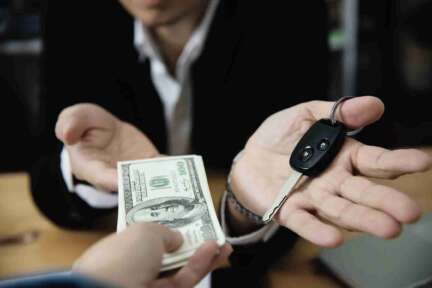Have you ever had to deal with a car loan, but you were still tempted by a more modern, sleeker car? It’s not uncommon. Many people ask, “Can you trade in a financed car?” The answer is yes, and it’s more frequent than you thought.
Whether you’re looking to reduce your monthly expenses, upgrade to a new car, or simply desire a new vehicle, selling a vehicle with an underlying loan is an entirely feasible option. However, as with everything else in life, there are pros and cons, and some things you should know before making a decision.
Let’s break it down into easy language, without complicated jargon, so that you are confident before going to the dealer.
Understanding Auto Financing

Before we discuss trade-ins, let’s first learn what auto financing means. If you finance a vehicle, it means you took out a loan to purchase the car. When the loan is not entirely completed, the lender legally owns the car, not you.
Suppose you’re considering trading in a finance-backed car, in essence. In that case, you’re soliciting the dealer to purchase the car from the lender and apply the amount towards the purchase of your next vehicle.
Two common scenarios exist:
Positive Equity: You owe less than your vehicle is worth.
Negative Equity: You owe more than what your car is worth (also known as having to be “upside-down” on the loan).
Be assured that each situation can be dealt with.
What Is Hyundai Finance and Other Automaker Financing?
Let’s suppose you purchased your car through Hyundai Finance. This means that Hyundai Motor Finance (HMF) is the company that lent you money. Hyundai, as well as other automakers, provides internal financing.
The finance departments of automakers, such as American Honda Finance or CarMax Auto Finance, typically offer attractive rates and offers like cashback or 0% APR deals. However, the process of trading in a vehicle that is financed by one of them is similar to the way that a dealer will call the lender, obtain an amount to pay off, and determine the amount of equity (if there is any) that remains.
Each automaker may have different processes; however, the fundamental procedure is identical.
How CarMax Auto Finance Handles Trade-ins
A very renowned firm for selling cars as well as trade-ins is CarMax. The CarMax system was designed so that it is easy and easy to understand. If your vehicle is funded through the CarMax Auto Finance, here’s what you will get:
- They’ll evaluate your vehicle, even if it’s being financed.
- If the value of your trade-in is greater than the loan repayment, you receive any difference as cash, or put it towards the next purchase.
- If your debt exceeds the car’s value, you’ll need to pay the difference or transfer it to your next loan.
- Always request a complete breakdown of the numbers before signing anything.
Use a Car Finance Calculator Before Making Decisions

Do you want to avoid unexpected costs? Utilize to avoid surprises? Use an auto financial calculator. These calculators are invaluable for determining the new monthly installment or the amount of equity you have.
A car finance calculator helps you:
- Calculate your monthly payment.
- Find out the amount you will pay off.
- Consider whether rolling over equity negative is sensible.
- Have an idea of what car you can afford next time around.
- There are many free calculators on the internet. Some dealerships have their calculator built into their websites.
What About American Honda Finance?
If you currently have a loan via American Honda Finance, the process of trading it in is pretty straightforward.
Steps typically comprise:
- Find Your Payoff Value. Sign in to your Honda Financial Services account or phone them directly.
- Assess Your Car. You can either use online tools or go to any dealership for an in-person quote.
Comparing Values:
- Find out whether your trade-in price is greater or lower than the loan’s payoff.
- Decide if the equity is positive; that’s great! If it’s negative, you must decide whether to pay for the difference or add it to your following credit.
- Honda dealerships are generally adept at handling these procedures and can guide you through the process.
Using an Auto Finance Calculator to Stay Smart
Let’s get back to numbers. A specially designed auto finance calculator will help you plan your budget better. This isn’t just about your next car; it’s also about your long-term financial circumstances.
If you are using an auto financing calculator, include the following details:
- Price of the vehicle
- Down payment
- Loan term (36, 48, 60 months, etc.)
- Rate of interest
- Value of trade-in
- Remaining loan balance
This provides you with a clearer understanding of your financial situation. You’ll understand how your choices affect your monthly payments and the cost of interest.
Understanding Auto Finance Rates

They’re affected by:
- Your credit score
- The term “loan”
- Vehicle age
- Down payment
- Lender (bank, credit union, automaker, etc.)
A better credit score means lower interest rates. However, even the credit you have isn’t ideal. Many lenders provide flexible choices.
Pro Tip:
Shop around. Compare rates from credit unions, banks, and dealer financing before you make a decision.
Can You Trade In a Financed Car With Negative Equity?
- The short answer is yes. It all depends on the situation.
If the value of your car’s trade-in is less than the loan’s payoff (negative equity), you’ll be either:
- Make the payment out of your pocket.
- Transfer the balance to the new credit.
Example:
You owe $18,000. The dealer offers you $15,000 in exchange for the trade-in. This is $3,000 of negative equity. You can either:
Make a payment of $3,000 to complete the deal.
Include that amount of $3,000 in the loan for your new car (which raises the price of the new car).
Make sure you’re happy with the amount of your new loan before deciding to accept the loan.
Why People Trade in Financed Cars
There are a variety of reasons one might be tempted to sell a car that is financed:
- They are looking for an affordable monthly installment.
- They are looking for a more modern car with more features.
- Their requirements are changing (e.g., the growing family).
- Repair costs for cars are increasing.
- The interest rates have risen, but refinancing does not make sense.
Whatever the reason, you should know that it’s a standard and manageable procedure insofar as you’re able to do the calculations.
Final Thoughts
What do you think? Is it possible to trade for a vehicle that is financed? Absolutely. It’s all you need to do is know the numbers, know your financial situation, and then work with an individual or a lender who is trustworthy and has experience.
Let’s go over what you’ll have to do:
Find out the amount of your loan’s payoff. Know the precise value of your trade-in. Utilize tools like a vehicle finance calculator or an auto financing calculator. Compare rates for auto financing. Determine whether to roll over the negative equity or repay it.
If you are prepared and ask the correct questions, you will be able to enhance your car without needing a loan.
FAQs
Can borrowing on a car that is financed harm my credit score?
It’s not directly. However, if you default on payments or add too much credit, it can impact your credit score.
What if I wanted to trade in my car at an alternative dealership to the one from which I purchased the vehicle?
Yes! You can exchange it anywhere, including online platforms such as CarMax and Carvana.
Do I need to pay first to pay off my loan?
It’s a matter of personal preference. If you’re getting close to being able to pay it off, then that could be a better option. If you’re in a position with negative equity, trading it in and then rolling over the balance might be a more feasible option.









Leave a Comment